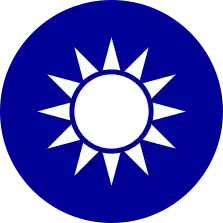Chen Ming-tong
Chen Ming-tong (Chinese: 陳明通; pinyin: Chén Míngtōng; born 25 November 1955) is a Taiwanese politician and currently the Director-General of the National Security Bureau. He was the Minister of the Mainland Affairs Council from 2018 to 2021 and 2007 to 2008.
Chen Ming-tong | |
|---|---|
| 陳明通 | |
.jpg.webp) | |
| Director-General of the National Security Bureau | |
| In office 23 February 2021 – 31 January 2023 | |
| President | Tsai Ing-wen |
| Preceded by | Chiu Kuo-cheng |
| Succeeded by | Tsai Ming-yen |
| Minister of the Mainland Affairs Council | |
| In office 19 March 2018 – 22 February 2021 | |
| Prime Minister | William Lai Su Tseng-chang |
| Deputy | Chiu Chui-cheng Lee Li-chen |
| Preceded by | Katharine Chang Lin Cheng-yi (acting) |
| Succeeded by | Chiu Tai-san |
| In office 10 April 2007 – 20 May 2008 | |
| Prime Minister | Su Tseng-chang Chang Chun-hsiung |
| Preceded by | Joseph Wu |
| Succeeded by | Lai Shin-yuan |
| Deputy Minister of the Mainland Affairs Council | |
| In office 20 May 2000 – 19 May 2004 | |
| Minister | Tsai Ing-wen |
| Personal details | |
| Born | 25 November 1955 Taichung County, Taiwan |
| Nationality | Taiwanese (Taiwan) |
| Political party | |
| Alma mater | National Taiwan University |
Academic career
Chen obtained his bachelor's, master's and doctoral degrees in political science from National Taiwan University (NTU) in 1979, 1981 and 1991, respectively. Chen worked as a researcher in the Research, Development and Evaluation Commission of the Taipei City Government in 1983-1984. After finishing his doctoral degree, he worked as associate professor followed by professor at the Graduate Institute of National Development of NTU from 1992 to 2000.
He was a thesis adviser to several politicians affiliated with the Democratic Progressive Party, including Chiu Chih-wei, Kao Chia-yu, Lin Chih-chien, Pan Men-an, and Shen Fa-hui.[1]
Political career
He led the Mainland Affairs Council (MAC) between 2007 and 2008, then returned to NTU. In 2018, he succeeded Katharine Chang as MAC minister.[2][3]
National Security Bureau
In 2022, he publicly claimed on the basis of intelligence that China was not going to invade Taiwan within the next several years while Tsai Ing-wen remained in office and that the Russian invasion of Ukraine had caused the mainland to re-evaluate their military plans regarding Taiwan. He also claimed that Taiwan had some knowledge of what the makeup of the Politburo Standing Committee of the Chinese Communist Party was going to be after the 20th National Congress of the Chinese Communist Party to be held later in 2022.[4]
His public revelation of this information was criticized by former army Major General Yu Beichen, he alleged that revealing such specific information put intelligence gathering in the mainland at risk.[5][6]
References
- Lin, Sean (26 July 2020). "KMT labels DPP officials plagiarists". Taipei Times. Retrieved 16 August 2020.
- Huang, Jewel (17 April 2007). "Newsmaker: Chen Ming-tong is part of the strategy". Taipei Times. Retrieved 23 February 2018.
- Hsu, Stacy (24 February 2018). "Reshuffle targets security, diplomacy". Taipei Times. Retrieved 24 February 2018.
- China unlikely to invade Taiwan this fall: intelligence chief OCAC.R.O.C.(Taiwan) – News 2022/03/25
- 台湾情报首长陈明通有关台海安全和中共二十大报告:两个关注要点背后的一个关键要素, BBC中文, retrieved May 14th 2022
- TAIWAN - CHINA Taiwan’s intelligence chief says Beijing not likely to launch invasion next fall AsiaNews 03/25/2022
External links
 Media related to Chen Ming-tong at Wikimedia Commons
Media related to Chen Ming-tong at Wikimedia Commons Quotations related to Chen Ming-tong at Wikiquote
Quotations related to Chen Ming-tong at Wikiquote
